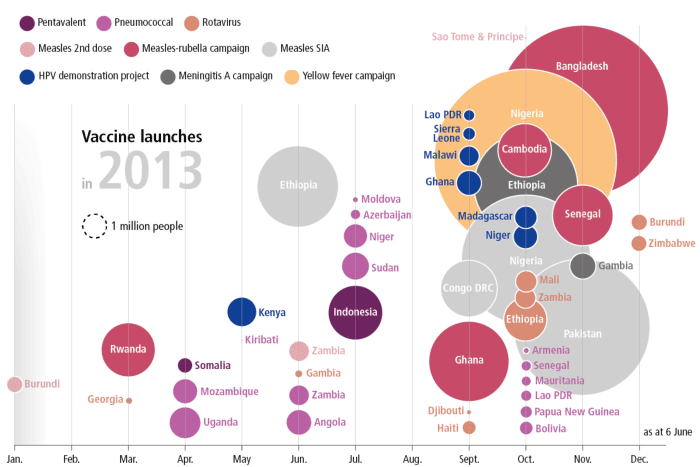
Vaccine introductions in 2013
Washington, DC, 18 June 2013 – Addressing USAID’s Distinguished Speaker series, GAVI Alliance CEO Dr. Seth Berkley today highlighted this year’s global acceleration in the delivery of life-saving vaccines to developing countries.
In 2013, an estimated 600 million doses of life-saving vaccines will reach children in the world’s poorest countries thanks to GAVI funding – testimony to the Alliance’s successful efforts to ensure children everywhere have equal access to immunisation.
GAVI expects to support 54 vaccine introductions this year alone - a mixture of routine programmes, campaigns and demonstration projects.
‘Fully immunised child’
In a speech which underlined the need to prioritise immunisation in the post Millennium Development Goal agenda, Dr. Berkley spoke passionately of adopting the ‘Fully Immunised Child’ as a global health indicator. This concept envisages a world in which all children have access to WHO’s 11 recommended life-saving vaccines.
Dr. Berkley also highlighted GAVI’s recent success in market shaping with regard to the price of human papillomavirus (HPV) vaccine, which protects girls and women against the main cause of cervical cancer. Thanks to the Alliance, the world’s poorest countries will now have access to a sustainable supply of HPV vaccines for as low as US$ 4.50 per dose; the same vaccines can cost more than US$ 100 in developed countries.
Priority
Drawing on a series of slides to illustrate the growing burden of cervical cancer deaths in GAVI eligible countries, Dr Berkley showcased current estimates demonstrating the significant decrease in maternal mortality and the sharp increase in cervical cancer deaths. Immunisation against HPV, he said, should become a priority in developing countries.
Last month, Kenya became the first country to start a human papillomavirus vaccine demonstration project with GAVI funding – the first of seven sub-Saharan countries to get this new type of GAVI support.
Dr. Berkley also discussed GAVI's role in health systems strengthening, and the importance of strengthening the cold chain to reduce vaccine wastage. GAVI is working with the private sector to explore new ways of strengthening the vaccine supply chain.
